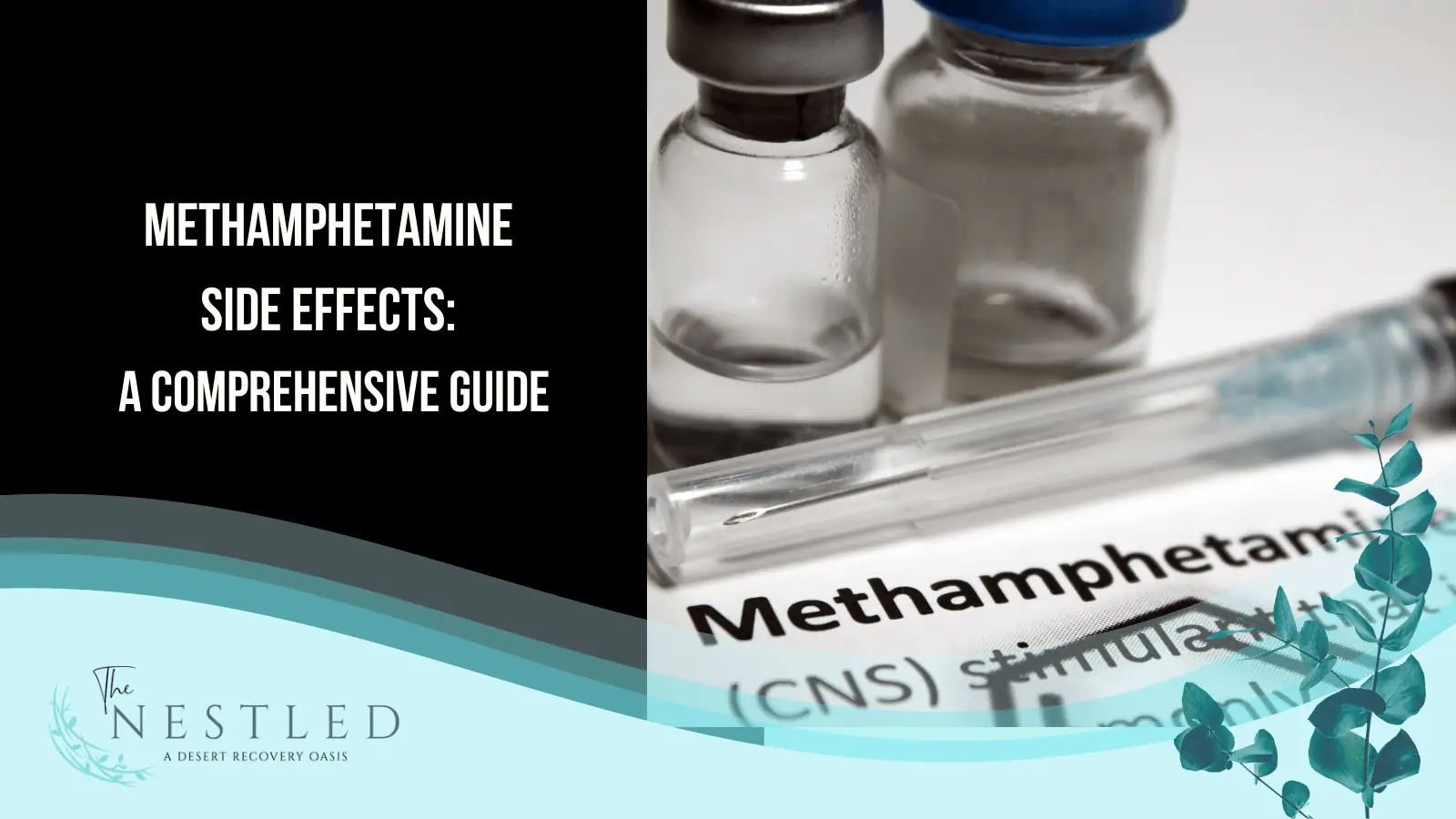Methamphetamine has gained notoriety for its devastating impact on individuals and communities worldwide. In January 2022, it was estimated that around 1.6 million people in the United States aged 12 and older had used methamphetamine in the past year, according to the Substance Abuse and Mental Health Services Administration (SAMHSA) National Survey on Drug Use and Health (NSDUH).
The misuse of meth can lead to a wide array of physical, psychological, and social consequences, impacting not only the users but also their families and communities. Understanding these methamphetamine side effects is important in raising awareness, promoting prevention, and facilitating effective treatment and support for those affected by methamphetamine use.

What is Methamphetamine? Understanding Its Impact
Methamphetamine, often referred to as meth, is a powerful and illicit stimulant drug that profoundly impacts the central nervous system. It is infamous for its highly addictive nature and the severe consequences it inflicts on both individuals and communities. Methamphetamine is synthetically produced and can take various forms, including a white powder, pill, or crystalline substance.
In terms of its chemical structure, methamphetamine is similar to amphetamine, a drug used to treat attention deficit hyperactivity disorder (ADHD) and narcolepsy, but methamphetamine has a methyl group attached to the nitrogen atom, which enhances its potency and alters its effects compared to amphetamine. Methamphetamine’s structure allows it to rapidly cross the blood-brain barrier, leading to its powerful and immediate effects on the brain and central nervous system.
The drug’s effects on the brain and body are intense, leading to heightened alertness, increased energy, and a sense of euphoria. However, these short-lived sensations are accompanied by a host of detrimental side effects. Understanding the scope and gravity of methamphetamine’s impact is pivotal in addressing the challenges it presents to public health and in developing effective strategies for prevention, treatment, and support for individuals affected by this devastating drug.
What are the Immediate Physical Side Effects of Meth Use?
Physical side effects of methamphetamine use can be intense and often include:
- Increased Alertness and Energy: Methamphetamine is a potent stimulant that causes a surge in energy, heightened alertness, and wakefulness.
- Elevated Heart Rate and Blood Pressure: Meth use can lead to a rapid heartbeat (tachycardia) and elevated blood pressure, which can increase the risk of cardiovascular complications.
- Decreased Appetite: Methamphetamine suppresses appetite, leading to decreased hunger and potentially significant weight loss in users.
- Dilated Pupils: Meth can cause pupils to dilate (enlarge), leading to a distinctive appearance often referred to as “meth eyes.”
- Increased Body Temperature: Users may experience a rise in body temperature, which can lead to excessive sweating and discomfort.
- Jaw Clenching and Teeth Grinding: Methamphetamine use can result in bruxism, causing users to clench their jaws and grind their teeth, which can lead to dental problems.
- Dry Mouth: Meth use often causes a dry mouth, leading to a condition known as “meth mouth,” characterized by severe dental decay and gum disease.
- Skin Problems: Users may experience skin issues, including acne, sores, and a sensation of crawling skin, which can lead to intense scratching and skin damage.
- Tremors and Muscle Twitches: Meth can cause involuntary muscle movements, tremors, and repetitive physical behaviors.
- Nausea and Vomiting: Some individuals may experience nausea and vomiting as a result of methamphetamine use.
- Increased Libido: Methamphetamine can lead to heightened sexual desire and risky sexual behaviors, contributing to the risk of sexually transmitted infections.
What are the Long-Term Side Effects of Chronic Methamphetamine Abuse?
Chronic methamphetamine abuse can lead to a range of severe and long-term physical, psychological, and social side effects, including:
- Physical Health Deterioration: Extended use of methamphetamine can result in significant physical health issues, including dental problems (often referred to as “meth mouth”), cardiovascular complications, respiratory issues, and gastrointestinal problems.
- Neurological Damage: Meth abuse can cause structural and functional changes in the brain, leading to cognitive impairments, memory deficits, and mood disorders. These effects can persist long after drug use has ceased.
- Psychiatric Disorders: Chronic methamphetamine abuse is associated with a higher risk of developing psychiatric conditions such as depression, anxiety, paranoia, hallucinations, and even psychosis. These mental health issues can be long-lasting and challenging to treat.
- Skin Problems: Skin-related issues may worsen with continued use, leading to severe acne, open sores, and the sensation of crawling or itching skin (formication).
- Weight Loss and Malnutrition: Chronic meth use often results in extreme weight loss due to decreased appetite and poor dietary habits, which can lead to malnutrition and weakened immune function.
- Cardiovascular Complications: Prolonged methamphetamine abuse increases the risk of heart problems, including irregular heart rhythms, heart attacks, and hypertension, which can have life-threatening consequences.
- Respiratory Issues: Smoking or inhaling meth can lead to respiratory problems, including chronic bronchitis and lung damage.
- Tolerance and Dependence: Over time, individuals develop a tolerance to methamphetamine, requiring larger amounts to achieve the desired effects. This can lead to physical and psychological dependence, making it challenging to quit.
- Withdrawal Symptoms: When attempting to detox from methamphetamine, users often experience withdrawal symptoms, including fatigue, depression, anxiety, intense cravings, and sometimes suicidal thoughts.
It’s important to recognize that the long-term side effects of chronic methamphetamine abuse can be severe and life-altering. Seeking professional treatment and support is essential for individuals struggling with meth addiction to address these issues and work towards recovery. Early intervention can significantly improve the chances of a successful recovery and reduce the risk of further harm.
Methamphetamine and Mental Health: Psychological Side Effects
Methamphetamine abuse has profound psychological effects, ranging from intense euphoria during use to severe mood swings, including irritability, anxiety, and depression as the drug’s effects wear off. It also often triggers extreme paranoia, leading to excessive suspicion and fear. Prolonged meth use may result in hallucinations and, in some cases, even psychosis, characterized by delusions and an altered perception of reality. The drug’s association with aggression and violent behavior can strain relationships and lead to legal consequences.
Anxiety and depression are common psychological side effects, with meth use exacerbating preexisting disorders or triggering new ones. Users often experience a “crash” during the comedown phase, contributing to profound depression and, in some cases, suicidal thoughts. Cognitive impairments, such as memory problems and impaired decision-making, can also persist, impacting daily functioning. Chronic methamphetamine abuse substantially increases the risk of developing mental health disorders, necessitating specialized treatment to address these complex psychological issues.

Behavioral Changes Associated with Meth Use
Behavioral changes associated with methamphetamine use are often profound and can have a significant impact on individuals’ lives. One of the most prominent behavioral effects of meth use is increased energy and hyperactivity, leading to restlessness and an inability to sit still. Users may exhibit erratic and impulsive behavior, such as engaging in risky activities or making impulsive decisions, which can have severe consequences.
Additionally, methamphetamine use often results in heightened alertness and decreased need for sleep, leading to prolonged periods of wakefulness. This can disrupt daily routines and lead to a cycle of sleep deprivation, further exacerbating the drug’s effects on behavior. Users may also become preoccupied with acquiring and using the drug, often neglecting responsibilities, relationships, and other aspects of their life. These behavioral changes can contribute to a downward spiral, impacting both the individual and those around them, underscoring the urgency of addressing methamphetamine addiction through comprehensive treatment and support.
The Neurological Impact of Methamphetamine on the Brain
The neurological impact is profound and can lead to both short-term and long-term consequences. When methamphetamine is used, it triggers a significant release of dopamine, a neurotransmitter associated with pleasure and reward, flooding the brain with an intense sense of euphoria. This excessive release of dopamine can lead to several neurological effects:
- Brain Structure Changes: Prolonged methamphetamine use can lead to structural changes in the brain, particularly in areas associated with decision-making, memory, and impulse control. These changes can result in cognitive impairments, making it challenging for individuals to make sound judgments and control their impulses.
- Dopamine Depletion: While methamphetamine initially causes a surge in dopamine levels, chronic use can deplete the brain’s dopamine reserves. This depletion can result in anhedonia, an inability to experience pleasure from everyday activities, and contribute to depression and apathy.
- Cognitive Dysfunction: Methamphetamine abuse is associated with cognitive impairments, including problems with memory, attention, and problem-solving skills. Users may struggle with learning and retaining information, impacting their daily functioning.
- Psychiatric Symptoms: Prolonged methamphetamine use is linked to the development of psychiatric symptoms, including anxiety, paranoia, hallucinations, and even full-blown psychosis. These symptoms can persist even after individuals stop using the drug.
- Neurological Cravings: The neurological changes induced by methamphetamine can result in intense drug cravings. Individuals may find it exceptionally challenging to quit using the drug due to these cravings and the powerful association between meth use and pleasure.
- Neurotoxicity: Methamphetamine is neurotoxic, meaning it can cause damage to nerve cells and neurons in the brain. This damage can contribute to long-lasting neurological deficits, impairing an individual’s cognitive and emotional well-being.
The neurological impact of methamphetamine is not limited to active drug use but can persist long after individuals have stopped using the substance. Seeking professional treatment and support is crucial for addressing these neurological effects and helping individuals regain cognitive function and emotional stability.
Dental Health and Methamphetamine: Understanding ‘Meth Mouth’
‘Meth Mouth’ is characterized by a range of dental issues, including tooth decay, gum disease, and the rapid deterioration of teeth. The reasons behind this dental devastation are multifaceted. Methamphetamine use can lead to dry mouth, a condition in which there is a reduced production of saliva. Saliva plays a crucial role in maintaining oral health by neutralizing acids, preventing tooth decay, and promoting overall oral hygiene. Without sufficient saliva, the protective mechanisms against dental problems are compromised, resulting in tooth decay and gum disease.
Meth use often leads to bruxism, a condition in which individuals unconsciously grind or clench their teeth. This repetitive grinding can cause severe damage to tooth enamel and, over time, lead to teeth breaking or becoming extensively decayed. The combination of poor oral hygiene practices, nutritional deficiencies resulting from meth-related appetite suppression, and neglect of dental care due to drug use can exacerbate these dental issues further.
As a result, individuals who use Meth may experience not only significant physical pain and dental complications but also profound emotional and psychological distress, which underscores the importance of addressing the comprehensive health impacts of methamphetamine abuse.
The Social and Emotional Toll of Methamphetamine Addiction
The toll of methamphetamine addiction is immense, affecting not only the individuals who use the drug but also their families, friends, and communities. On a personal level, meth addiction can lead to profound feelings of isolation, hopelessness, and despair. As the drug takes hold, users often become increasingly preoccupied with obtaining and using meth, neglecting their relationships, responsibilities, and personal well-being. This can lead to a breakdown in social connections, strained family bonds, and a sense of alienation from loved ones.
Emotionally, methamphetamine addiction can lead to a rollercoaster of intense mood swings, including euphoria during use and deep depression during the drug’s comedown. These emotional fluctuations can contribute to a cycle of drug-seeking behavior as individuals use meth to alleviate emotional pain.
Meth abuse is linked to anxiety, paranoia, and in some cases, psychosis, which can further strain social relationships and exacerbate emotional distress. Addressing the social and emotional toll of meth addiction is a complex endeavor that often requires comprehensive treatment and support to help individuals rebuild their lives and repair damaged relationships.

Recovery and Rehabilitation: Overcoming Meth Side Effects
Recovery and rehabilitation are essential steps in overcoming the damaging side effects of methamphetamine abuse. Meth use can lead to severe physical and psychological consequences, but with the right support and treatment, individuals can regain their health and well-being. Comprehensive recovery programs often include medical care, therapy, counseling, and support networks to address the complex challenges associated with meth addiction and its lasting impact.
For those seeking help to overcome the devastating effects of methamphetamine abuse, consider reaching out to The Nestled Recovery. Their experienced team offers comprehensive recovery programs tailored to individual needs, providing the necessary guidance and support to begin on a path to healing and sobriety. Don’t hesitate to take the first step toward recovery—reach out to The Nestled Recovery today and begin your journey towards a healthier, brighter future.








